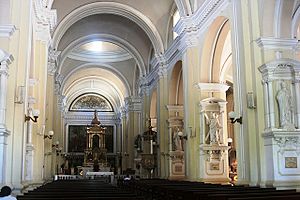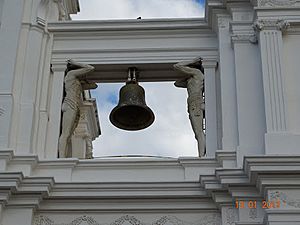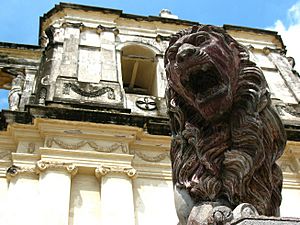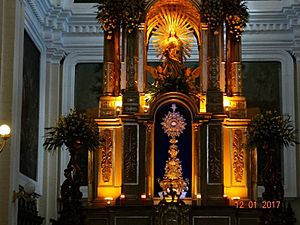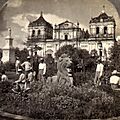León Cathedral, Nicaragua facts for kids
Quick facts for kids Cathedral of the Assumption of Mary, LeónCatedral de la Asuncíon de María de León |
|
|---|---|
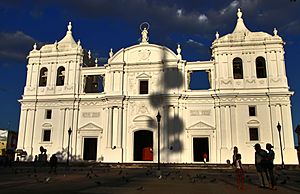 |
|
| Religion | |
| Affiliation | Roman Catholic |
| Province | Diocese of León |
| Year consecrated | 1860 |
| Location | |
| Location | León, Nicaragua |
| Architecture | |
| Architect(s) | Diego José de Porres Esquivel |
| Architectural style | Baroque and Neoclassical |
| Groundbreaking | 1747 |
| Completed | 1814 |
| Official name: León Cathedral | |
| Type | Cultural |
| Criteria | ii, iv |
| Designated | 2011 (35th session) |
| Reference no. | 1236rev |
| State Party | |
| Region | Latin America and the Caribbean |
The Cathedral of the Assumption of Mary is a very important and old building in León, Nicaragua. It is also known as the "Royal and Renowned Basilica Cathedral of the Assumption of the Blessed Virgin Mary." This amazing cathedral was named a World Heritage Site by UNESCO. It is one of Nicaragua's most famous cultural places.
Contents
Building the Cathedral
The construction of the cathedral took a long time. It started in 1747 and finished in 1814. Pope Pius IX officially blessed it in 1860.
This cathedral is the largest in Central America. It is also one of the most famous cathedrals in all of the Americas. People know it for its special design and its important history.
Cathedral Design
The design for the cathedral was created in 1762. It was made by a Guatemalan architect named Diego José de Porres Esquivel. The building combines two main styles: Baroque and Neoclassicism. You can also see small influences from other styles like Gothic and Renaissance. This mix of styles makes the building unique.
The cathedral has a rectangular shape. This was a common design for cathedrals back then. It has a main area called a nave and four side areas called aisles. There are also ten arched sections and two towers at the front. A large dome sits over the center of the building.
Inside, the cathedral is very spacious. Large columns separate the main nave from the side aisles. The front of the building looks grand, mixing Baroque details with Neoclassical style. The windows are arched, and the two towers have interesting Chinese-style domes.
The cathedral's walls are very strong. This has helped it survive many challenges. It has stood strong through earthquakes, volcanic eruptions from the Cerro Negro volcano, and even wars.
Underneath the church, there are seven tunnels. These tunnels lead to other churches in the city. The church also has seven cellars. These cellars help make the building stable during earthquakes. The cathedral has 34 domes above ground. These domes help bring in lots of natural light and fresh air. This makes it one of the best-lit cathedrals in America. In the past, people could be buried under the cathedral. This helped raise money to build and maintain the church.
Rich History
This cathedral is historically very important. It was the first main church for the Catholic Church in Nicaragua. This church area, called a diocese, was started in 1531. This makes it one of the oldest dioceses in America. Today, it is still the main church for the Diocese of León.
Deep below the cathedral, in special crypts built to survive earthquakes, are the remains of 27 people. These include 10 bishops, 5 priests, and an important leader from Nicaragua's independence movement. Also buried there are three famous poets, a musician, six important people, and even a slave.
Many famous Nicaraguan people are buried here. These include Miguel Larreynaga, and poets like Rubén Darío, Salomón de la Selva, and Alfonso Cortés. The musician José de la Cruz Mena is also buried here. Other notable people include Dr. Luis H. Debayle and Professor Edgardo Buitrago. The first bishop of León, Monsignor Simeón Pereira, is also laid to rest here.
The tomb of Rubén Darío is at the foot of a statue of Saint Paul. Darío was a very important poet. He is known as the "Prince of Castilian letters" because of his influence on Spanish-language literature.
In the early 1900s, Bishop Simón Pereira y Castellón asked a sculptor named Jorge Navas Cordonero to create several statues. Navas sculpted the statue of the Virgin Mary that sits on top of the main front part of the cathedral. He also made the large statues between the front and the towers. Navas also created the statues of the Twelve Apostles inside the church. He sculpted the lion on Darío's tomb, which looks like the famous Lion of Lucerne in Switzerland. He also made the sculpture of Christ on Monsignor Pereira's tomb and other decorations inside the cathedral.
The cathedral also holds a small piece of what is believed to be the original cross where Jesus died.
Famous People Buried Here
Many important people are buried in the Cathedral of the Assumption of Mary:
- Bishops: Diego Alvaréz de Osorio, Francisco de Mendavia, and Antonio de Valdivieso. Their remains were moved here from León Viejo in 2008. Other bishops include Juan Benito Garret y Arlovi, Domingo Antonio Zattarain, José Antonio Flores de Ribero, Juan Carlos Vílchez y Cabrera, Nicolás García Jerez, Simeón Pereira y Castellón, Agustín Nicolás Tigerino y Loáisiga, and Cesár Bosco Vivas Robelo.
- Priests: José Desiderio de la Quadra, Remigio Casco, Rafael Jerez, Félix Pereira y Castellón, and Marcelino Areas.
- Independence Hero: Miguel Larreynaga (1772-1847). His ashes were brought from Guatemala in the 1970s.
- Poets: Rubén Darío (1867-1916), Salomón de la Selva (1893-1959), and Alfonso Cortés (1893-1969).
- Musician: José de la Cruz Mena. His ashes were moved here in 1998.
- Notable People: Alfonso Ayón, Pedro Argüello (a mayor of León), Leocadia del Prado Arguello, Dr. Luis H. Debayle and his wife Casimira Sacasa, and Professor Edgardo Buitrago.
- A Saintly Slave: According to writer Ernesto Cardenal, a slave known for their good deeds is also buried here.
World Heritage Site
Because of its amazing art, culture, and history, the cathedral was named a World Heritage Site by UNESCO on June 28, 2011. It was the second site in Nicaragua to receive this special recognition.
UNESCO described the cathedral like this: The Cathedral of León in Nicaragua was built between 1747 and the early 1800s. Its design was by the Guatemalan architect Diego José de Porres Esquivel. It shows a mix of Baroque and Neoclassical styles. The cathedral is known for its simple inside decoration and how much natural light it has. The main altar area has very rich decorations. Inside, the cathedral has important artworks, including an altar from Flanders and paintings of the 14 stations of the Via Crucis by Nicaraguan artist Antonio Sarria.
Images for kids
See also
 In Spanish: Catedral de León (Nicaragua) para niños
In Spanish: Catedral de León (Nicaragua) para niños
 | Isaac Myers |
 | D. Hamilton Jackson |
 | A. Philip Randolph |


